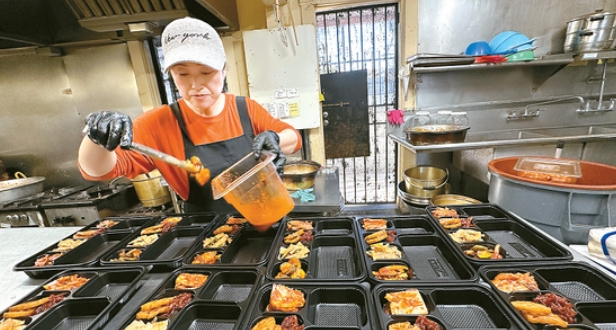A new rival has emerged in the food delivery industry. Korean food catering businesses have entered the restaurant market with home delivery.
Home delivery companies have grown rapidly during the pandemic. They gained popularity by delivering meals to the doorsteps of consumers who were afraid to shop at the market or eat at restaurants due to the virus.
However, as the pandemic ends and inflation skyrockets, many consumers cut back on food delivery as they began to feel the burden of delivery fees. This is where Korean food caterers have stepped in.
Previously, the Korean catering industry catered to weddings, birthdays, corporate events, and celebrations. With the inflation following the pandemic, catering businesses’ customers have expanded to include fashion district businesses, office workers, hospitals, pharmacies, logistics companies, senior health centers, and general offices.
As lunch inflation has made lunch more expensive for office workers, caterers have also seen an increase in orders for bento boxes. According to the catering industry, an increasing number of office workers are ordering bento boxes for lunch and adding catering menus for dinner as well.

“Office workers who buy lunch on the way to work are ordering catered food for dinner,” said CEO Keum Hee Ju of Sang Rok Soo Catering, explaining that two bento boxes cost $24, which is enough for dinner for a family of two or three.
The new customer base for catering is diverse. Working moms and remote workers living in LA Koreatown are among the main customers, as they can eat home-cooked meals while saving time on grocery shopping and cooking.
“Working moms, caregivers, and remote workers like catered foods as it saves them time grocery shopping and cooking, and it’s delivered for free,” said Chong K. Lee, owner of Song Yi Catering. “Catering delivery or in-store pickup two to three times a week accounts for 10 to 15 percent of our total sales.”
In LA Koreatown apartment complexes, several families regularly order catering home delivery two to three times a week. The customers save on delivery costs, and the business saves time delivering meals to multiple customers at once.
The advantage of home delivery is that the menu changes daily. Main dishes such as beef, pork, grilled fish, and stir-fried squid are served with side dishes and soup. The price varies from $10 to $15 per person, and the delivery fee ranges from free to $20 depending on the company.
You can also order just the items you want. “We often have customers who have had catering for weddings and events who become home delivery customers,” says Michelle Oh, CEO of Nakwon Catering. “We have a wide range of menu choices, including Korean, Chinese, and Japanese, so customers can customize their diets, and there is no minimum order for delivery.”
Working moms in LA Koreatown often order in advance from caterers and pick up their meals on their way home from work to save money on delivery services.
For Umma Kitchen, which has a store that provides home delivery service, home delivery accounts for 50 percent of its sales. The minimum order is $65, and delivery costs $8 from LA Koreatown to Irvine. Due to growing customer demand, the company plans to open new locations in Cerritos in May and Little Tokyo in May or June.
“Working moms who work in LA Koreatown buy a variety of Jeons (fried pancakes) and frozen soups such as Korean skewers and meatball pancakes, which are made daily, directly from the store,” said Chris Han, manager of Umma Kitchen. “It’s popular because there are 20 to 30 different types of soups. And one serving is enough for two people to eat two meals.”
The popularity of K-food has also led to an increase in orders for Korean-style catering among younger non-Koreans.
One of the leading catering companies is Michelle Spoon, which started more than a decade ago when Chef Michelle Cho, who gained fame in the Orange County area for her cooking classes, started offering home meal kit catering services to her friends.
“Since I started social media marketing, I’ve gotten 10 to 20 percent of my customers from non-Koreans, and many of them have been regular customers for one to two years,” Cho said. Cho explaining that the $40 to $65 meal kits are popular.
Recently, caregivers have also been coming to the catering businesses.
BY EUNYOUNG LEE, JUNHAN PARK [lee.eunyoung6@koreadaily.com]



![Green card interviews used as decoy for ICE arrests U.S. Immigration and Customs Enforcement (ICE) agents arrest a man after a hearing at an immigration court in Manhattan, New York, on Oct. 27. [REUTERS]](https://www.koreadailyus.com/wp-content/uploads/2025/12/1226-ICE-100x70.jpg)
